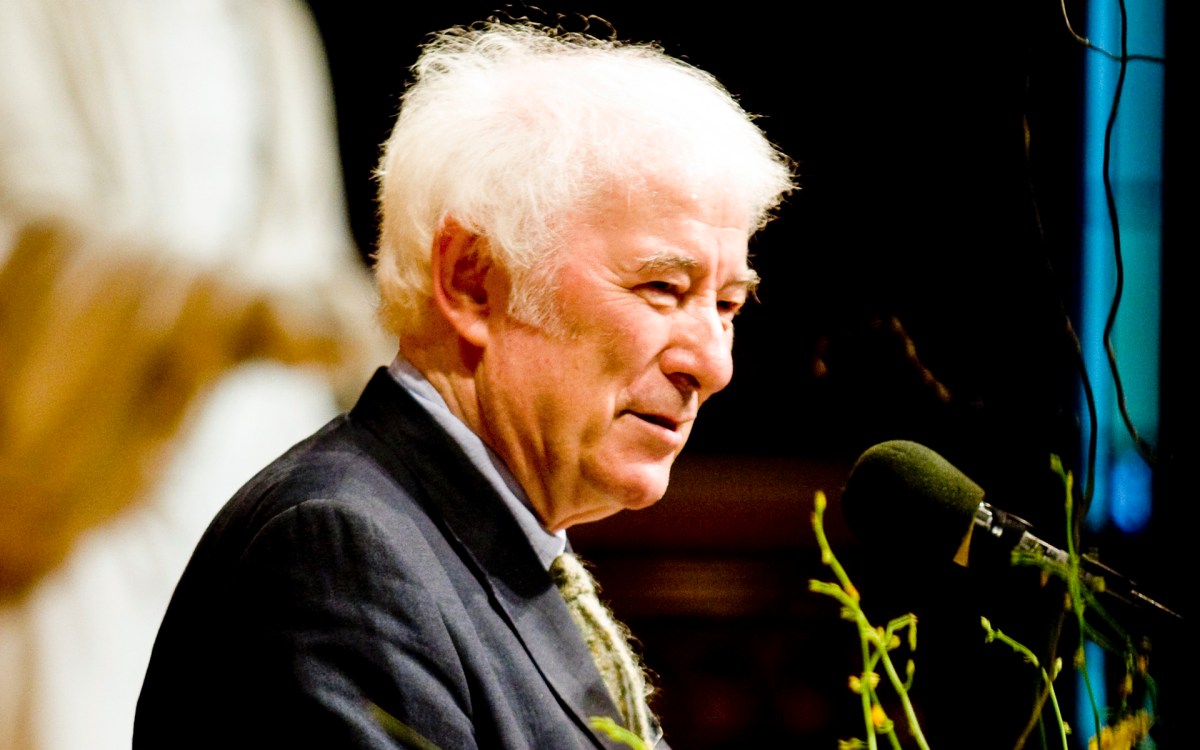Tag: History
-
Campus & Community
Visual history of Fine Arts Library covers decades
In preparation for the Fine Arts Library’s relocation in 2009 during the renovation of the Fogg Art Museum, the library presents “‘An Invaluable Partner …’: Eighty Years of the Fine Arts Library.”
-
Campus & Community
Du Bois Institute announces new fellows
Henry Louis Gates Jr., Alphonse Fletcher University Professor and director of Harvard’s W.E.B. Du Bois Institute for African and African American Research, has announced the appointment of 18 new institute fellows for the 2008-09 academic year.
-
Arts & Culture
J.J. Audubon the beginner featured in new book
Although the name John James Audubon is synonymous with beautifully detailed, scientifically accurate drawings of birds, many of his early drawings were destroyed by Audubon himself, but an intriguing selection remains in the collections of Harvard’s Houghton Library and the Ernst Mayr Library of the Museum of Comparative Zoology (MCZ).
-
Campus & Community
Houghton sets sights on reception
Houghton Library will host an opening reception on Tuesday (Sept. 16) from 5 to 7 p.m. for its major fall exhibition, “To Promote, to Learn, to Teach, to Please: Scientific Images in Early Modern Books.” The exhibition examines how images in early modern European books of science (1500-1750) not only were shaped by the needs…
-
Campus & Community
This month in Harvard history
Sept. 7, 1775 — The “New-England Chronicle or Essex Gazette” advertises that the Harvard Corporation and Overseers have chosen the Town of Concord as “a proper place for convening the Members of the said public Seminary of Learning” as the Revolution rages in Cambridge. Students are due in Concord by Oct. 4; probably less than…
-
Nation & World
Boston Public School teachers go back to class
What do ancient Rome and the reign of Queen Elizabeth I have to do with the development of the United States government? A lot, according to Harvard government professor Daniel Carpenter.
-
Campus & Community
Gates documentary series receives $12M in funding
The Corporation for Public Broadcasting (CPB) and the Public Broadcasting Service (PBS) recently announced funding in the amount of $12 million for three, new public television documentary series in which Henry Louis “Skip” Gates Jr. will explore the meaning of race, culture, and identity in America. Gates is the Alphonse Fletcher University Professor at Harvard…
-
Campus & Community
Intellectual historian Fleming dies at 84
Donald Fleming, an intellectual historian who studied the impact of science on American thought and was a member of the Harvard faculty for more than 40 years, passed away at his Cambridge home on June 16. He was 84.
-
Campus & Community
Rescued Russian bells leave Harvard for home
In a succession of brief ceremonies outside Lowell House this week (July 8), Harvard University officially returned to authorities of the Russian Orthodox Church the last of a set of monastery bells saved from a Stalinist-era scrap heap.
-
Campus & Community
Herbert Bloch
At a Meeting of the Faculty of Arts and Sciences on May 6, 2008, the Minute honoring the life and service of the late Herbert Bloch, Pope Professor of the Latin Language and Literature, Emeritus, was place upon the records. Bloch did pioneering work on Greek and Roman historians.
-
Campus & Community
This month in Harvard history
June 1, 1774 — Several parliamentary punishments for the Boston Tea Party (December 1773) take effect, and British troops occupy Boston. “[C]onsidering the present dark aspect of our public Affairs,” the Harvard Corporation votes “that there be no public Commencement this Year.” Ceremonies do not resume until 1781.
-
Arts & Culture
Maggie Spivey: Archaeologist, comedian, princess
Walk past Maggie Spivey in the Yard or on the streets of Cambridge, and you might find her with head down, eyes glued to the ground. She’s not being anti-social, or lamenting a flubbed grade — this dynamic archaeology concentrator just knows that often the most fascinating stories can be found underfoot.
-
Campus & Community
This month in Harvard history
June 1766 — Designed by colonial governor Sir Francis Bernard, the new Harvard Hall (still standing, with several later modifications) opens to replace its predecessor, destroyed by fire in 1764.
-
Nation & World
Precocious pundit Alexander Burns is off to D.C.
While still an undergraduate, Alexander Burns already had an impact on political discourse in the United States. Beginning in 2005, the history and literature concentrator has been a principal contributor to a political blog sponsored by the history magazine American Heritage. The job has allowed him to explore the pros and cons of contemporary issues,…
-
Campus & Community
This month in Harvard history
May 4, 1943 — At the Boston Chapter of the American Institute of Architects, the Boston firm of Perry, Shaw & Hepburn accepts the J. Harleston Parker Gold Medal for Houghton Library as the best architecture in New England for 1942. The City of Boston has given the award annually since 1923.
-
Arts & Culture
Reminiscences of Maxim Gorky
In 1895, Russian journalist Alexei Maximovich Peshkov, a onetime shoemaker’s apprentice who had quit school at 10, adopted a new name: Maxim Gorky. After that, literary fame came fast and furious for this self-taught, fresh-voiced grandson of a Volga boatman. Gorky — the name means “bitter” — could tell a story, remember everything he read…
-
Campus & Community
This month in Harvard history
May 6, 1945 — At noon a novel contraption appears on high as a helicopter hovers over Harvard and lands on the riverbank in front of the Business School. A Coast Guard pilot and another officer alight from the craft to present a letter from the president of the Lexington Chamber of Commerce to a…
-
Arts & Culture
Radcliffe Fellow, poet Elizabeth Alexander reads
It was show and tell for poet Elizabeth Alexander this week. The Yale University professor of African American studies, a Radcliffe Fellow this year, used a May 5 reading to show the depth and musicality of her poems, short stories, and penetrating essays — and to tell the story of inspiration’s multiple avenues.
-
Campus & Community
This month in Harvard history
May 23, 1910 — The Harvard Corporation formally adopts crimson as Harvard’s official color, based on the tint of several silk scarves used by Harvard rowers in the 1858 Boston City Regatta and preserved in the University Archives.
-
Nation & World
Rothschild explores economics’ human side
Blackmail and attempted murder are not typically studied as part of economic history. However, a credit crisis among 18th century French silk and brandy merchants led to just such dramatic incidents, the accounts of which piqued the interest of Emma Rothschild, a historian of economic life, empires, and Atlantic connections.
-
Arts & Culture
‘Instability and Decomposition’
Instability is the reign of things erratic and unpredictable. Decomposition is the state of being as it unravels, nicely captured by a common sentiment: Things fall apart. The two words — and the frictive, unstable worlds they imply — were at the heart of a convocation of young scholars last week (April 25-26).
-
Arts & Culture
Lucky shot? Photography and chance
Chance smiled on Joe Rosenthal in late February 1945. The young Associated Press photographer was atop Mount Suribachi to cover the Allied troops’ capture of Iwo Jima when he heard that soldiers were preparing to raise an American flag. It was the second attempt of the day, for authorities had decided the first flag —…
-
Arts & Culture
New name conveys museum’s mission
The Harvard University Art Museums — a leading center for research and teaching in the visual arts comprising three museums and four research centers — has changed its name to the Harvard Art Museum.
-
Campus & Community
This month in Harvard history
May 9, 1643 — Lady Mowlson (Ann[e] Radcliffe) creates Harvard College’s first scholarship fund with a gift of £100. The “Harvard Annex,” founded in 1879 for women’s education, formally adopts her maiden name in 1894 to become known as Radcliffe College.
-
Arts & Culture
Ghent Altarpiece is window into history of art
To Hugo van der Velden, professor of history of art and architecture in the Faculty of Arts and Sciences, the Ghent Altarpiece is more than a landmark — it’s also an excellent teaching tool. The painting is the focus of Van der Velden’s History of Art and Architecture course, “Jan van Eyck and the Rise…
-
Campus & Community
This month in Harvard history
April 23, 1949 — For the eighth consecutive time, the Harvard Varsity Crew wins the Compton Cup Race on the Charles, outrowing teams from Princeton, MIT, and Rutgers. “All of the races were rowed under miserable conditions — wind, rough water, rain, and, in the varsity race, semi-darkness,” notes Athletics Director William J. Bingham ’16.
-
Arts & Culture
Houghton exhibit features Islamic sciences
If scholarship is the only reliable means of time travel, the Houghton Library offers up Harvard’s latest time machine: “Windows into Early Science,” an exhibit of scientific manuscripts, maps, and illustrated books on display through May 23.
-
Arts & Culture
The complex legacy of slavery in Brazil
On Thursday (April 17), Lilia Moritz Schwarcz joined Zephyr Frank, assistant professor of Latin American history at Stanford University, for a lunchtime conversation about race in Brazil in both the era of the slave trade and today. The event, titled “Slavery, Abolition and Race in Brazil,” was part of an ongoing series in the Brazil…
-
Arts & Culture
The literary roots of human rights
The aim was determining the truth and the technique was torture. Pain was administered in secret, under strict guidelines, often with a judge and doctor present. Once a suspect confessed, the confession would have to be repeated in court.


